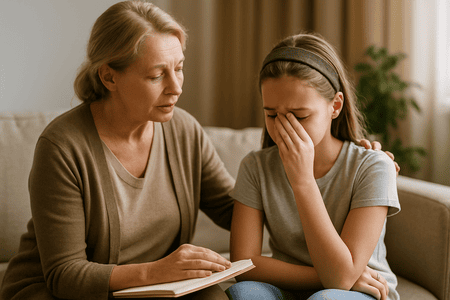Family Support Services at Funeral Homes

Choosing a Pet-Friendly Funeral Home
June 1, 2025
Technology Integration in Funeral Homes
June 1, 2025Grief doesn’t follow a timeline. It doesn’t end when the service does, and it rarely fits neatly into a schedule. That’s why many funeral homes now offer more than just logistics—they help families carry the emotional weight of loss long after the arrangements are complete.
Support services fill the gap between practical planning and personal healing. From grief counseling to post-funeral paperwork, families often need help navigating decisions they didn’t expect to make. For many, those resources offer relief, guidance, and a sense of continuity when everything else feels uncertain.
More funeral homes recognize that the role doesn’t stop at burial or cremation. They’re stepping forward to meet emotional needs with the same care they give to ceremony and ritual.
What Are Family Support Services?
Family support services refer to the practical and emotional resources offered to help loved ones cope with loss before, during, and after a funeral. They go beyond event planning—they’re about holding space for grief while easing day-to-day burdens.
That support may include:
- Referrals to grief therapy or licensed counselors
- Access to support groups—online or in person
- Help with estate paperwork, benefits, and insurance forms
- Guidance for memorial planning and remembrance projects
More families ask for these options today than ever before. They want care that continues beyond the service. They expect support that honors emotional recovery just as much as ceremony.
The shift reflects a deeper understanding of what it really means to grieve. And funeral homes that offer this kind of care don’t just serve—they support in every sense of the word.
Key Family Support Services Offered by Funeral Homes
Families often face more than emotional grief after a loss. They’re also left with decisions, logistics, and details that feel overwhelming. Funeral homes offering family support services help lighten that load—practically and emotionally. Here’s how they do it.
Grief Counseling and Therapy Referrals
Some funeral homes keep licensed counselors on staff. Others partner with local therapists or grief centers to make sure families can find professional care quickly. Either way, they act as a bridge to help, not just a provider of referrals.
Support may include:
- One-on-one grief sessions for surviving spouses or children
- Specialized care for traumatic loss or sudden death
- Child-focused counseling with age-appropriate approaches
- Short-term grief workshops to help navigate the first year
In smaller communities, funeral directors often serve as a quiet referral network—connecting families with trusted counselors they’ve worked with for years.
Support Groups and Community Resources
Grief is easier to carry when it’s shared. That’s why many funeral homes coordinate or host grief support groups. Some offer in-person meetups at their facilities. Others link families to local nonprofits, churches, or online platforms offering peer support.
Common options include:
- Weekly or monthly grief support circles
- Virtual support sessions for out-of-town relatives
- Faith-based programs hosted by religious leaders
- Ongoing newsletters or grief education emails
Families grieving alone often benefit most from these community spaces. Knowing they’re not the only ones can lift a quiet weight.
Post-Funeral Assistance and Aftercare
Once the funeral ends, families are often left facing insurance claims, benefit paperwork, and estate tasks they never anticipated. Some funeral homes step in with aftercare programs designed to make that process manageable.
Support may include:
- Help with Social Security notifications or VA forms
- Guidance on death certificates and benefit claims
- Templates for thank-you cards or memorial letters
- Estate paperwork assistance or referrals to probate attorneys
One Midwest funeral home assigns each family a single aftercare advisor who checks in regularly over the first 60 days. That kind of follow-up builds trust—and provides peace of mind.
Memorial Planning and Legacy Services
Remembering someone goes beyond the service. Families often want to honor their loved one’s story with memorials that carry forward. Funeral homes can help guide them through that process with thoughtful, hands-on planning.
Support may include:
- Designing personalized keepsakes, from fingerprint jewelry to tribute videos
- Creating and managing digital memorial pages
- Organizing charity donations in lieu of flowers
- Helping families plan future memorial events or anniversary services
Some funeral homes offer “legacy packages” that combine digital and physical elements to preserve a loved one’s memory across generations.
Benefits of Family Support Services for Grieving Families
Support doesn’t stop at the casket. When funeral homes offer thoughtful services beyond the ceremony, they give families more than convenience—they create space for healing, closure, and connection. Here’s how those efforts make a lasting impact.
Emotional Healing and Coping Support
Grief isolates people. Structured support brings them back into connection—with themselves, with others, and with their own memories. Whether it’s a one-on-one session with a grief counselor or a quiet evening at a support group, that space helps normalize grief and reduce the sense of loneliness.
Licensed professionals offer tools for coping: guided reflection, healthy rituals, and permission to feel however they need to feel. Children benefit too. Age-appropriate counseling helps younger family members process confusing emotions in a safe environment.
That kind of support shortens no grief—but it softens the edges.

Reducing Family Stress and Burden
Families often feel stretched thin after a loss. They’re planning a service, handling logistics, and trying to support one another all at once. When funeral homes step in with clear, coordinated aftercare—paperwork guidance, benefit claim support, memorial coordination—they take real weight off the family’s shoulders.
One family may need help writing thank-you cards. Another might need instructions for VA benefits or estate forms. Support staff who already know the family’s situation can step in quickly, saving hours of confusion and emotional overload.
Every minute saved gives them more time to remember, rest, and begin to heal.
Building Long-Term Community Connections
Support services don’t just help the family—they also help strengthen the relationship between the funeral home and its broader community. Families who feel seen and supported are more likely to return in the future or refer others.
Some funeral homes stay in touch long after the service ends. They offer seasonal remembrance events, holiday grief sessions, or anniversary letters. Those quiet gestures often matter most.
It’s not about selling a package. It’s about being a steady hand through one of life’s hardest seasons—and showing families they don’t have to go through it alone.
How Families Can Access Support Services at Funeral Homes
Support can’t help if nobody knows it’s available. Families navigating loss shouldn’t have to guess what’s offered—or when to ask. Accessing family support services starts with a few small, intentional steps.
Ask About Available Services Upfront
Most families focus on logistics during funeral planning. But grief support, counseling referrals, and aftercare should be part of that early conversation. Funeral directors often have a menu of services they’re ready to offer—they’re just waiting to be asked.
Bring it up during your first meeting. Ask if the funeral home offers grief therapy referrals, help with estate paperwork, or connections to community support. The earlier that conversation happens, the more personalized the support can be.
Participate in Available Programs
Even the most compassionate programs only help when families take part. Many funeral homes offer optional group sessions, private counseling referrals, or healing workshops. Others partner with local nonprofits or religious organizations to extend their support.
If you’re offered a resource that fits your needs—or your child’s or partner’s—take it. Grief doesn’t follow a script, but consistent support makes a real difference.
Stay Connected After the Funeral
The formal ceremony might mark an ending, but grief doesn’t work on a schedule. Many funeral homes recognize that and keep doors open well beyond the final service.
Families can follow up weeks or months later to ask for new referrals, updates on support groups, or guidance with lingering paperwork. Some funeral homes even check in periodically with families they’ve served, offering gentle reminders that care hasn’t ended.
When families stay connected, they often discover new support they didn’t need right away—but truly appreciate down the line.


